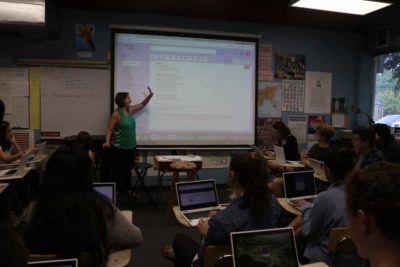Over the past four months, I have explored research, perspectives, and perspectives on research on the power of writing. I have also read pieces like “The Power of Writing Begins with a Single Sentence” and “The Real Reason So Many Young People Can’t Write” about the declining state of writing instruction in schools. It’s worrisome on its face: writing was once part of the critical “three Rs” of education. However, a polarized political environment tackling grave social issues showcases an even more serious reason to consider the importance of writing: the need for an engaged citizenry.
In order to have an engaged citizenry, the citizenry needs to be able to express itself in writing. In a recent email exchange, Representative D. Craig Horn (R-Union) supported this premise, “The whole notion of civil (and civic) discourse centers on one’s ability to express themselves…we are forced to develop our own argument in opposition when writing. Consequently, it requires one to gain understanding of the countervailing point in order to develop a thoughtful argument to the contrary.”
And, to clarify — this does not mean 140 and 280 character Tweets or short Facebook blurbs confirming one’s dissatisfaction with the status quo or one’s desire to maintain the status quo.
The rising generation needs to be the kind of society that can outline an issue effectively, address both sides of an argument, and propose a realistic solution. In short, they need to be able to write.
Research suggests writing helps with critical thinking: studies show you think through issues differently when you put pen to paper than otherwise. In the traditionally non-writing discipline of biology, researchers found the benefits of writing proficiency were clear: “The effects of writing [on critical thinking] were determined within the context of multiple covariables. Results indicated that the writing group significantly improved critical thinking skills whereas the nonwriting group did not.”
I have seen this play out as Director of Hope Street Group’s NC Teacher Voice Network. An educator in our program will have an idea or challenge and, by writing about it, they have arrived at a well-articulated solution they can share with decision-makers. It is part of the competency development we believe is so crucial to policy involvement.
Susan Herbst, President of the University of Connecticut, articulated the same result of this thinking process in her position to support civic discourse on campus: “the essential component [of civic discourse] is that a position must be supported with critical thinking and rational thought backed by data.” Critical thinking that is, in large part, due to an ability to write proficiently. More evaluation of academia’s views on teaching civic discourse suggests the same. For example, in 2013 The Association of American Colleges and Universities published an article that cites “excellent written communication” as a “core intellectual ability” of civic engagement.
Last fall I sat down with Rep. Horn to discuss, among other things, his opinion on teacher engagement in civic discourse. His passion for an involved electorate always sustains my faith in government officials, but this time I also left re-energized in my commitment to helping teachers write as a key driver of their engagement in policy issues. Relatedly, he mentioned his interest in the development of a curriculum for students centered around the skills and knowledge needed for civic discourse.
What I’m unsure of, though, is how to reconcile what I hear and read about the state of writing instruction in schools with the future of the involved electorate Rep. Horn (and myself, and others, I presume) believes we need for successful government and policy. Rep. Horn’s idea on coursework on civic discourse is inspiring and addresses that critical need for an engaged citizenry. For this, I am thankful.
Integral to that coursework, though, will be a strong writing component that teaches students the power of a persuasive argument and the impact of publishing their thoughts. By capitalizing on the opportunity to combine writing and civic discourse, we can reinforce the benefits of writing proficiency in schools while supporting a future generation of engaged citizens.



